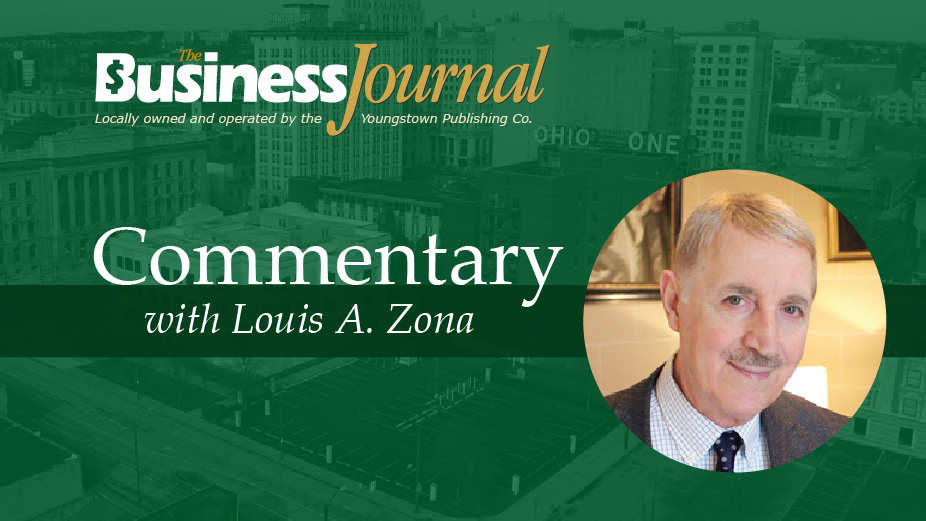By Louis A. Zona
YOUNGSTOWN, Ohio – A wonderful experience of growing up in the 1950s was life in the summertime before video games and other such diversions.
I grew up on Center Street, a dead end, dirt street on the south side of New Castle where a dozen families shared their neighborhood with heavy industry.
While there were no playgrounds or ballfields for a dozen or so kids about the same age, there was Neshannock Creek, a sizeable wooded area, large cinder covered parking lots for laborers who worked in the mills, and even flatbed trucks no longer used. All of this made for a fun filled summer.
The creek (although polluted at the time) became the main source of fun with fishing, catching crabs, floating in inner tubes and swimming.
The parking lots were our ball fields. Sliding on cinders was no fun, nor was the occasional foul ball into the Pennsylvania Engineering Works windows, which meant that the game had ended with mill security chasing us into the wooded area.
Because we used bricks as bases, turning one’s ankle was commonplace. The deserted flat beds became pirate ships or spacecraft.
The wooded area encouraged wonderful imaginative games of cowboys and Indians. I always had to be Gene Autry in our made-up cowboy games in the woods. He was my boyhood idol before Mickey Mantle replaced him.
By the way, I got to meet Gene Autry when a Butler exhibit traveled to the West Coast for the opening of the Gene Autry Museum.
While I never chose to be Roy Rogers in our boyhood imagination games, I also got to meet him, along with his wife, Dale Evans. Being an Ohioan did make him special in our games.
The New Castle Junk Co. made it possible to use parts of bikes and other broken-down wagons to be turned into imaginary racecars. As I recall, Mr. Roland Levine owned the junkyard and appreciated those times when we asked to use a piece of junk or two to feed our creative energies. He was a super nice fellow.
Summertime also meant that Johnny the Snowball Man would visit Center Street. We lined up to the window in his van to get our 10-cent cup of colored ice that he would shave off of a large ice cube with a little metal device.
But of all the special people who visited this special street, a milkman by the name of Tony Panella stands out in my memory. Tony’s milk truck not only provided milk for the families on the street but also small bottles of chocolate milk.
A familiar whistle announced his arrival. That meant chocolate milk for all the kids in the neighborhood along with a two-block ride on the milk truck. Tony Panella was a kind soul and his generosity helped to make our neighborhood that much more special.
The great thing about living on a dead-end street meant that automobile traffic seldom interrupted our touch football games. And since no one owned an actual football for the games, we would tightly roll the town newspaper, The New Castle News, and hold it together with black electrical tape.
After games of baseball and football on the dirt street, our feet were as dirty as the street itself. And when the city occasionally oiled our dirt street to keep down the dust, Mom was beside herself as she dealt with black oil stains on her favorite carpet.
One memorable aspect of life on Center Street was dealing with a 24-foot cement wall that divided the riverbank from the backyards of property owners. I surmise that the purpose of the wall, which had to have been constructed during the Second World War, was to keep residents from the hot metal transported on railroad tracks.
But as a visual component of the neighborhood, that enormous wall could not be missed. It was a curiosity, to say the least.
My father never learned to drive since all of his needs were not far from home. When he was working as a barber, the shop was a few blocks away as was his later employment at Mesta Machine Co.
Frankly, everything was handy – from downtown stores to movie theaters to grocery stores. Mom and Dad never missed church on Sunday with two churches just five minutes in either direction of home.
I’ve written several times about the uniqueness of that one-time neighborhood called Center Street. I wish that I could go back there in a time machine to introduce you to that place and the character of the people who lived there. The street was lost to the redevelopment authority and gone are the houses of the dozen or so families who called it home. To this day, when I see one of my former neighbors from Center Street, it is wonderful to greet them with a big smile and a hug.
It is then that we remind one another of Tony the drunk, of Mary booking numbers, of Gene teasing his sisters by hanging her babydolls out an upstairs window, of Jake and his super mean dog, of Miss Lou and her kind and simple ways, of Mrs. Bell and her warm and loving smile, of Irvine who taught us basketball as well as poems about sportsmanship.
I wish that I could take you there and introduce you to my dad, who would have a Hershey Bar, fresh from the vending machine in the mill. And is that Tony Panella’s whistle reminding us that our chocolate-milk bottles have arrived and a ride on his milk truck awaits us?
